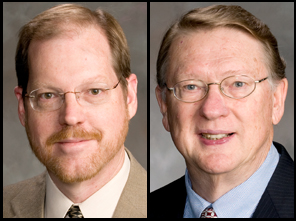
Two new research centers at UNL - one on algal biology and another on nanohybrid research - received a more than $11 million boost this week from a National Science Foundation award.
The funding award is the major part of a five-year, $20 million Nebraska EPSCoR grant announced Oct. 4, involving 29 faculty from seven disciplines at five universities: UNL, UNMC, UNK, Creighton, and Doane College. The "Track 1" award from NSF also expands opportunities for private industry-university research and development partnerships.
UNL's planned Center for Nanohybrid Functional Materials will combine the efforts of chemists, engineers, and biologists to develop fundamental new science related to sensing and separation of targets ranging from small molecules to toxins. The center will include 15 faculty members - including 10 from UNL - and will be led by Professors Patrick Dussault and Mathias Schubert, UNL faculty members in the Departments of Chemistry and Electrical Engineering, respectively.
According to Dussault, the center will bring together investigators from two broad areas of science. One group has experience in creating highly ordered nanostructures, such as tiny silicon spirals that have unique characteristics in terms of how they appear under certain frequencies of light. Other center members are experts in using chemical and biochemical agents such as RNA or antibodies to bind a particular target such as a drug or a virus.
"The intersection of these two areas of research is anticipated to result in materials with unique characteristics," Dussault said. "For example, the biochemical component of a nanohybrid may enable highly sensitive recognition of a toxin molecules, while the underlying nanoscaffold may allow sensitive and selective 'read out' of the results."
Research in the nanohybrid center will investigate both fundamental science and potential applications to new classes of sensors and separation devices, with potential impact on areas as diverse as disease detection and homeland security. Dussault said there is real potential for local and regional technology development.
"A significant factor in the federal decision to fund the nanohybrid center was the strength of Lincoln-area and Nebraska technology-based industries, along with the support of several potential industrial partners," he said.
The Nebraska Coalition for Algal Biology and Biotechnology builds on UNL's innovation in research on algae and algal biotechnology, focusing on the production of renewable biofuels to replace gasoline and diesel. Project area coordinator Donald Weeks, Maxcy Professor of Agriculture and Natural Resources, said the project will expand on UNL's research in developing algal compounds of high value to society, such as specialty chemicals and drugs for humans or animals.
"We are identifying new molecular tools for molecular pathway engineering in order to alter the pathways in useful ways," Weeks said. "This research is applicable in the algal biofuels arena, but we're also very interested in producing other high-value compounds as well."
Weeks said the research team includes nine UNL faculty (James Van Etten, Donald Weeks, Heriberto Cerutti, Robert Spreitzer, Ed Cahoon, Paul Black, Concetta DiRusso, Thomas Clemente and Cheryl Bailey), and one each at Doane (Brad Elder), Creighton (Karin van Dijk) and UNK (Paul Twigg). Two new NCABB faculty members will be hired into the Department of Biochemistry, the Center for Plant Science Innovation and the School of Biological Sciences, in part, with funding to NCABB from the NSF EPSCoR grant.
Research team members for the Center for Nanohybrid Functional Materials include Mathias Schubert, Eva Schubert, Yongfeng Lu, Ming Han, Ned Ianno, and a faculty member yet to be hired as part of the grant, all from UNL's Department of Electrical Engineering; Patrick Dussault, David Hage, Rebecca Lai and a new additional faculty member all from UNL chemistry department; Dr. Stephen Hinrichs at UNMC pathology and microbiology; Scott Darveau and Chris Exstrom from UNK chemistry department; Stephen Gross from Creighton's chemistry department and Andrea Holmes from Doane College's chemistry department.
Part of the EPSCoR funding supports outreach and education to high schools and science education and workshops in Nebraska, and collaborative research with other universities.
Dussault said that a core facility anchoring the efforts of the Nanohybrid Center would likely be housed in Scott Engineering Complex, with individual research activities by center members taking place in labs across the five campuses. The addition of the nanomaterials research building will also help the research. Weeks said the algal research will continue primarily in the Beadle Center. Funding will support additional faculty or researchers and staff, including two for the nanohybrid center.
The Experimental Program to Stimulate Competitive Research was created by Congress in 1978 to assist states receiving a disproportionately smaller amount of federal research dollars. Since 1991, Nebraska EPSCoR has brought in more than $250 million in federal research and infrastructure dollars. The $20 million award announced Oct. 4 is the largest award it has received.
- Kelly Bartling